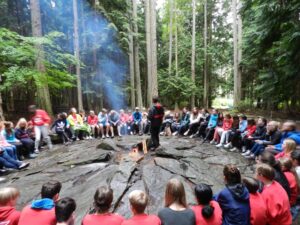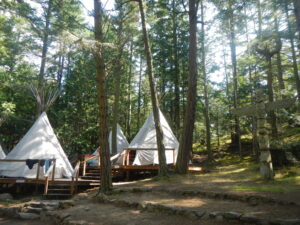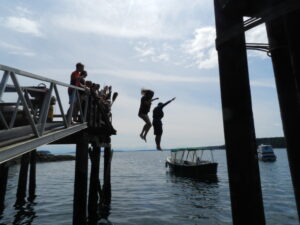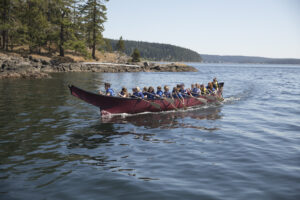No connectivity, better connections: Teenagers’ experiences of a phone-free summer camp in the US
About the author

Charlotte Megret graduated from the Outdoor Environmental and Sustainability Education MSc programme. She works mostly in outdoor residential settings and is interested in how communities are built and impact participants’ experiences. You can contact her via email charlotte.megret@outlook.com. This research has been published in the Journal of Adventure Education and Outdoor Learning
Background
A teen without their phone. This almost seems like a rarity these days as society has accepted personal technology as an integral part of young people’s identity. In Outdoor Environmental Education (OEE), this is a divisive topic. While some educators seek to embrace the technological revolution to better connect with young participants, others shun it and see the outdoors as the ideal place for a ‘digital detox’. I believe understanding teenagers’ perspectives is essential to explore the place of mobile phone technology in OEE.
The research
I decided to delve into campers’ experiences at Canoe Island French Camp (CIFC) in the US, where phones are banned. After working for CIFC for 3 summers, I re-immersed myself in life at camp for 6 weeks and researched the impact of the no-phone policy, utilising case study methodology within the interpretive paradigm. To get a detailed picture, I interviewed and observed campers but also staff members and parents (n=31). The overarching result was clear: they were happy campers.

Finding 1: Grateful for no-phone policy
Although it took participants a few days to adjust, the majority expressed feeling grateful for the no-phone policy, as it “forced” (that word was often used) them to interact with others and the place. The policy also encouraged campers to “re-learn to be bored” during quiet times and pick up bracelet making, Ukulele playing or simply reading. They also slept better and felt relaxed as they avoided the constant solicitations of social media. A few campers expressed feeling out of the loop regarding the news or missing their own music and they were all eager to offer suggestions on how to address some of these difficulties, but not one was against the policy.
“I’m lucky that no one in my tipi snuck in their phone, so you can have really deep conversations [and] actually get to know each other” (camper).
 Finding 2: CIFC is a special place, the only place to let go of their phone
Finding 2: CIFC is a special place, the only place to let go of their phone
It would be easy to jump to conclusions and say “let’s ban phones in OEE!”. But the second finding shows that campers believed CIFC was a ‘special place’, the only place they could let go of their phone. This begs the question as to why, and is arguably the most important point for educators. First, despite teenagers not having their phone, CIFC adopted a balanced approach to technology, encouraging staff to use it for educational or entertainment purposes and cultivating a strong online presence for parents. Second, life at camp was bustling and engaging, and campers expressed they did not need their phone. Finally, but most importantly, the element that was most conducive to a positive phone-free experience was the camp’s community. Campers felt supported by the tight knit community, therefore making giving up their phones easier, but also expressed worries that allowing phones would have a negative impact on that community.
“I wonder about the direction of causality: no phones create strong community, or strong community makes no phone easier?” (staff).
 Finding 3: Impossible to mitigate phone use at home
Finding 3: Impossible to mitigate phone use at home
The implication of finding #2, mainly that a successful phone-free experience was dependant on the place, led to finding #3: teenagers were unsure about how applicable the experience was in “real life”. Many admitted that it was almost impossible for them to mitigate their phone-use at home. Yet, some campers also showed enthusiasm for trying to reduce it, with some suggesting they would make their parents take their device at night, or try to remember their positive experience at camp.
“I hope campers think about how much they’re on their phones in real life and how much fun they had at camp and make a connection” (camper).
 Conclusion
Conclusion
Conducting this case study helped me better understand the complex relationship between adolescents and their phones. This particular OEE context was conducive to a highly positive phone-free experience; yet, campers showed great awareness of their phone over-use at home and their struggles to overcome it. This brings a few questions in mind: why is “real life” so contrasted with “camp life” and I wonder if, for instance, schools may be able to learn a thing or two from it. Is camp simply a “fix” teenagers enjoy once a year to get away from their phones, or does the experience have a more profound impact on the long term? Although the findings support the idea that banning phones on OEE programmes can be beneficial, a one-size fits all approach is not appropriate. Many factors influence the success or failure of phone policies, and educators need to spend time reflecting on the ones I highlighted and discussing the topic with those most affected – teenagers.




Comments are closed
Comments to this thread have been closed by the post author or by an administrator.